
Data-Centric Engineering
Scope & Guideline
Pioneering Research at the Intersection of Data and Engineering
Introduction
Aims and Scopes
- Data-Driven Optimization:
The journal frequently publishes research on optimization techniques using data-driven models, highlighting how data can inform and enhance engineering design and decision processes. - Digital Twin Technologies:
A significant focus is placed on digital twin methodologies, which integrate real-time data with physical systems to improve monitoring, predictive maintenance, and operational efficiency. - Machine Learning Applications in Engineering:
The integration of machine learning techniques within engineering frameworks is a core area, with research exploring applications from structural health monitoring to predictive modeling in various engineering domains. - Uncertainty Quantification and Risk Assessment:
Research often addresses the quantification of uncertainties in engineering models, applying statistical and probabilistic methods to improve reliability and safety in engineering applications. - Multiphysics and Multiscale Modeling:
The journal emphasizes studies that combine multiple physical phenomena and scales in modeling, utilizing data-centric methods to enhance the understanding of complex systems.
Trending and Emerging
- Artificial Intelligence and Machine Learning Integration:
There is a marked increase in papers exploring the integration of AI and machine learning techniques into engineering practices, emphasizing their potential to transform predictive modeling and automation. - Advanced Digital Health Engineering:
Emerging research on digital health engineering, particularly in the context of aging infrastructure and healthcare applications, highlights the growing relevance of data-centric approaches in public health and safety. - Graph Neural Networks and Their Applications:
The application of graph neural networks is gaining momentum, particularly for modeling complex relationships in engineering problems, showcasing the versatility of these advanced methods. - Sustainable Engineering Practices:
A rising trend towards sustainability is evident, with research focusing on environmentally conscious engineering practices and the role of data in optimizing resource usage and reducing emissions. - Real-Time Data Analytics in Engineering:
The development of methodologies for real-time data analytics is becoming increasingly important, with papers addressing how immediate data insights can enhance decision-making and operational efficiency in engineering contexts.
Declining or Waning
- Traditional Statistical Methods:
There appears to be a waning interest in traditional statistical approaches to engineering problems, as researchers increasingly favor data-driven and machine learning methods that offer greater flexibility and predictive power. - Physical Experimentation:
Research relying heavily on physical experimentation without the integration of data-centric methodologies is becoming less common, reflecting a shift towards simulations and computational modeling. - Basic Data Management Techniques:
The focus on foundational data management techniques, such as simple database management or basic data collection methods, is declining in favor of more advanced analytics and big data solutions. - Generic Engineering Models:
The use of generic engineering models that do not leverage specific data insights is less prevalent, as there is a growing trend towards customized, data-informed models that address specific engineering challenges.
Similar Journals
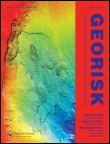
Georisk-Assessment and Management of Risk for Engineered Systems and Geohazards
Pioneering Insights for Safer Engineered SystemsGeorisk - Assessment and Management of Risk for Engineered Systems and Geohazards is a premier journal published by Taylor & Francis Ltd, focusing on the interdisciplinary fields of building and construction, civil and structural engineering, geology, and geotechnical engineering. With a commendable impact within the scholarly community, it holds a distinguished Q1 ranking across multiple categories, reflecting its relevance and quality. The journal addresses critical issues related to risk assessment and management, especially concerning engineered systems and geohazards, making it an invaluable resource for researchers, professionals, and students dedicated to safety, risk, reliability, and quality. Operating under rigorous peer-review standards, it offers insights and innovative methodologies that empower stakeholders in making informed decisions. The journal is accessible via subscription, providing a wealth of knowledge from 2007 to 2024. Engaging with Georisk ensures that readers remain at the forefront of research and practical solutions in managing risks associated with complex engineering challenges and geological threats.
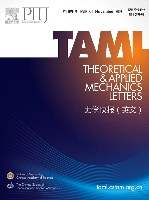
Theoretical and Applied Mechanics Letters
Unlocking the Future of Mechanics with Open Access ResearchTheoretical and Applied Mechanics Letters, published by ELSEVIER, stands as a premier journal in the field of engineering and applied mechanics, recognized for its rigorous peer-reviewed articles that advance theoretical and practical frameworks. With an impressive open access policy established in 2015, the journal enhances global accessibility to cutting-edge research across a range of disciplines including Aerospace, Civil, Mechanical, and Biomedical Engineering, along with Computational Mechanics and Ocean Engineering. The journal boasts an enviable position in the academic landscape, achieving a Q1 rank in several categories as of 2023, while being cited among the top percentiles in Scopus Ranks, specifically ranking #25 in Aerospace Engineering and #15 in Computational Mechanics. The journal aims to foster innovation by providing a platform for scholars and professionals to disseminate their findings, thereby bridging the gap between theoretical research and practical applications. By promoting a diverse range of topics and methodologies, Theoretical and Applied Mechanics Letters not only contributes to the advancement of engineering disciplines but also supports the global academic community in exploring sustainable and impactful engineering solutions.
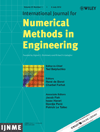
INTERNATIONAL JOURNAL FOR NUMERICAL METHODS IN ENGINEERING
Elevating engineering practices with cutting-edge research.INTERNATIONAL JOURNAL FOR NUMERICAL METHODS IN ENGINEERING, published by WILEY, stands at the forefront of research in the fields of applied mathematics, engineering, and numerical analysis, as evidenced by its prestigious Q1 category rankings across these disciplines for the year 2023. With a long-standing legacy since 1969 and an impressive trajectory projected through 2024, this journal is dedicated to advancing the methodologies and applications of numerical techniques in engineering contexts. Researchers and professionals can access cutting-edge findings that contribute significantly to the optimization and innovation of engineering practices. Although it operates under a subscription model, the journal's impact factor and high citation rates underscore its vital role in influencing contemporary engineering research and education. Its rigorous selection process ensures high-quality, peer-reviewed articles that reflect the latest advancements and challenges in the field, making it an indispensable resource for academics, industry experts, and students alike.
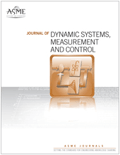
JOURNAL OF DYNAMIC SYSTEMS MEASUREMENT AND CONTROL-TRANSACTIONS OF THE ASME
Pioneering insights in mechanical and systems engineering.JOURNAL OF DYNAMIC SYSTEMS MEASUREMENT AND CONTROL - TRANSACTIONS OF THE ASME is a renowned periodical published by the American Society of Mechanical Engineers (ASME), focused on advancing the field of dynamic systems, measurement, and control. With a rich publication history spanning from 1971 to 2025, this journal serves as a pivotal platform for disseminating high-quality research aimed at enhancing understanding and innovation in various sectors, including mechanical engineering, control and systems engineering, and information systems. The journal currently holds a respectable Q2 category ranking in multiple fields, reflecting its commitment to excellence and rigorous peer-review standards. Although it does not offer open access, its extensive reach within the academic community exemplifies its significance, making it an indispensable resource for researchers, professionals, and students eager to engage with cutting-edge advancements. For those seeking to expand their knowledge and contribute to the dialogue surrounding dynamic systems and control mechanisms, JOURNAL OF DYNAMIC SYSTEMS MEASUREMENT AND CONTROL stands out as a critical reference.

Nature Machine Intelligence
Pioneering Insights in Artificial Intelligence and BeyondNature Machine Intelligence, published by NATURE PORTFOLIO, is an esteemed academic journal that significantly contributes to the fields of Artificial Intelligence, Computer Vision, Human-Computer Interaction, and Software Engineering. Launched in 2019, this journal has swiftly ascended to prominence, holding Q1 status across multiple categories in the 2023 Scopus rankings, highlighting its rigorous peer-review process and high-quality research output. With an impressive 99th percentile ranking in key area categories such as Computer Networks and Communications, it has established itself as a vital platform for disseminating innovative research and fostering scientific dialogue among scholars and professionals. Although the journal is not open access, it provides a wealth of information to its audience, making it essential for those engaged in cutting-edge research and development. Academic institutions, researchers, and industry professionals can rely on Nature Machine Intelligence for the latest advances and methodologies in artificial intelligence-driven technologies.
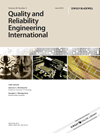
QUALITY AND RELIABILITY ENGINEERING INTERNATIONAL
Shaping the Future of Reliability and Quality EngineeringQUALITY AND RELIABILITY ENGINEERING INTERNATIONAL is a prestigious journal published by WILEY, dedicated to advancing the fields of quality, reliability, and engineering. With an ISSN of 0748-8017 and an E-ISSN of 1099-1638, this journal provides a platform for scholarly articles that delve into the intricacies of management science, operations research, safety, risk, reliability, and quality, as evidenced by its strong ranking in the Q2 category for both Management Science and Operations Research, as well as Safety, Risk, Reliability, and Quality. Established in 1985 and continuing through 2024, the journal has garnered a solid reputation in the academic community, achieving a Scopus ranking in the 70th and 64th percentiles for its respective categories. Although it does not offer open access, its authoritative content is essential for researchers, professionals, and students seeking to deepen their understanding of quality and reliability principles. With its UK-based publishing address ensuring global reach, this journal remains at the forefront of discussions surrounding engineering quality and reliability methodologies.
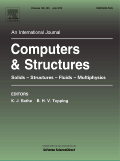
COMPUTERS & STRUCTURES
Transforming Engineering with Computational InsightsCOMPUTERS & STRUCTURES is a leading interdisciplinary journal published by Pergamon-Elsevier Science Ltd, focusing on the application of computer methods in the fields of civil and structural engineering, mechanical engineering, materials science, and modeling and simulation. With a prestigious history dating back to its inception in 1971, this journal is committed to advancing the knowledge and methodologies that integrate computational techniques with structural analysis and design. Recognized in 2023 with a Q1 ranking across several categories, including Civil and Structural Engineering and Computer Science Applications, COMPUTERS & STRUCTURES emphasizes the importance of innovative research that pushes the boundaries of traditional engineering practices. Although the journal does not currently offer open access, it remains an invaluable resource for researchers, professionals, and students seeking to disseminate and discuss groundbreaking findings that are shaping the future of engineering and materials science. The rigorous peer-review process ensures the publication of high-quality articles that contribute to the global discourse in these critical fields.

Modelling
Catalyzing Research in Engineering, Science, and Math.Modelling is a distinguished open access journal published by MDPI since 2020, dedicated to advancing the field of computational modeling across various scientific disciplines including Computer Science, Engineering, and Mathematics. With its base in Switzerland, the journal aims to foster a collaborative environment for researchers and practitioners while providing a platform for high-quality research on modeling and simulation techniques. As of 2023, it has garnered respectable rankings, achieving Q3 in Computer Science and Mathematics, and Q2 in Engineering, with notable Scopus values indicating an increasing impact within the academic community. Modelling not only publishes innovative research findings but also encourages the dissemination and discussion of emerging methodologies, making it a vital resource for scholars seeking to contribute to and expand the frontiers of knowledge in their respective fields. As an open access journal, it promotes unrestricted access to research outputs, ensuring greater visibility and impact for researchers and students alike.

Multiscale and Multidisciplinary Modeling Experiments and Design
Pioneering multidisciplinary approaches in applied mathematics and materials science.Multiscale and Multidisciplinary Modeling Experiments and Design is a dynamic journal published by SPRINGERNATURE, dedicated to advancing the fields of applied mathematics, materials science, and mechanics of materials. With an ISSN of 2520-8160 and an E-ISSN of 2520-8179, this journal provides a platform for innovative research and multidisciplinary approaches that address complex modeling and experimental challenges from 2018 to 2024. Ranked in the Q3 quartile across its categories and holding respectable positions within Scopus rankings, it serves as a vital resource for researchers and professionals seeking to explore emerging techniques and solutions in their fields. Despite its recent inception, Multiscale and Multidisciplinary Modeling Experiments and Design fosters a collaborative environment for knowledge exchange, making it essential for anyone at the forefront of scientific discovery. Open access availability ensures that the groundbreaking research published within is accessible to a broad audience, promoting global collaboration and innovations.
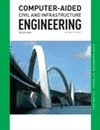
COMPUTER-AIDED CIVIL AND INFRASTRUCTURE ENGINEERING
Redefining Infrastructure through Innovative ResearchCOMPUTER-AIDED CIVIL AND INFRASTRUCTURE ENGINEERING, published by WILEY, stands as a leading journal in the domains of civil and structural engineering, computational theory, and computer-aided design since its inception in 1986. With an impressive ISSN of 1093-9687 and E-ISSN of 1467-8667, this esteemed UK-based journal holds a prestigious position in the academic community, reflected by its Q1 ranking in numerous relevant categories, including Civil and Structural Engineering and Computer Graphics as of 2023. The journal is renowned for promoting innovative research that utilizes computational techniques to solve complex engineering problems, making it an essential resource for researchers, professionals, and students alike. Despite its lack of open access options, the journal garners significant interest due to its rigorous peer-review process and high-impact articles, underlining its importance in the advancement of infrastructure engineering practices and technologies. With a Scopus ranking placing it among the top journals in various engineering and computer science fields, COMPUTER-AIDED CIVIL AND INFRASTRUCTURE ENGINEERING continues to foster knowledge and collaboration, ultimately contributing to the future of smart and resilient infrastructure development.